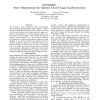Free Online Productivity Tools
i2Speak
i2Symbol
i2OCR
iTex2Img
iWeb2Print
iWeb2Shot
i2Type
iPdf2Split
iPdf2Merge
i2Bopomofo
i2Arabic
i2Style
i2Image
i2PDF
iLatex2Rtf
Sci2ools
102
click to vote
ICCAD
1997
IEEE
1997
IEEE
OPTIMIST: state minimization for optimal 2-level logic implementation
We present a novel method for state minimization of incompletely-specified finite state machines. Where classic methods simply minimize the number of states, ours directly addresses the implementation’s logic complexity, and produces an exactly optimal implementation under input encoding. The method incorporates optimal “state mapping”, i.e., the process of reducing the symbolic next-state relation which results from state splitting to an optimal conforming symbolic function. Further, it offers a number of convenient sites for applying heuristics to reduce time and space complexity, and is amenable to implementation based on implicit representations. Although our method currently makes use of an input encoding model, we believe it can be extended smoothly to encompass output encoding as well.
Hardware | ICCAD 1997 | Implementation’s Logic Complexity | Incompletely-specified finite State | Optimal Implementation |
Related Content
| Added | 06 Aug 2010 |
| Updated | 06 Aug 2010 |
| Type | Conference |
| Year | 1997 |
| Where | ICCAD |
| Authors | Robert M. Fuhrer, Steven M. Nowick |
Comments (0)

